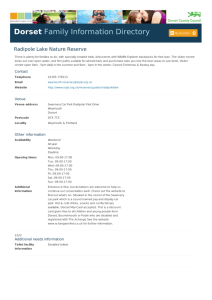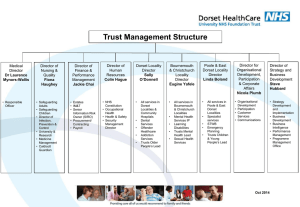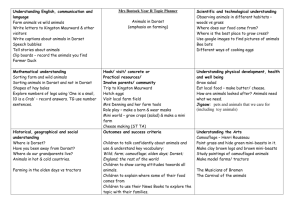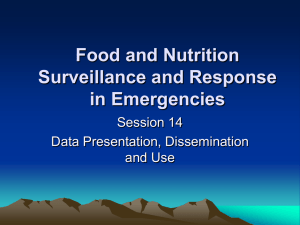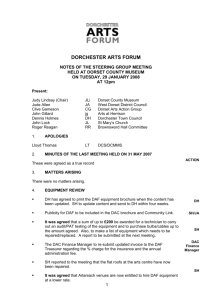'Losing Weight is Not Always Great' (powerpoint
advertisement
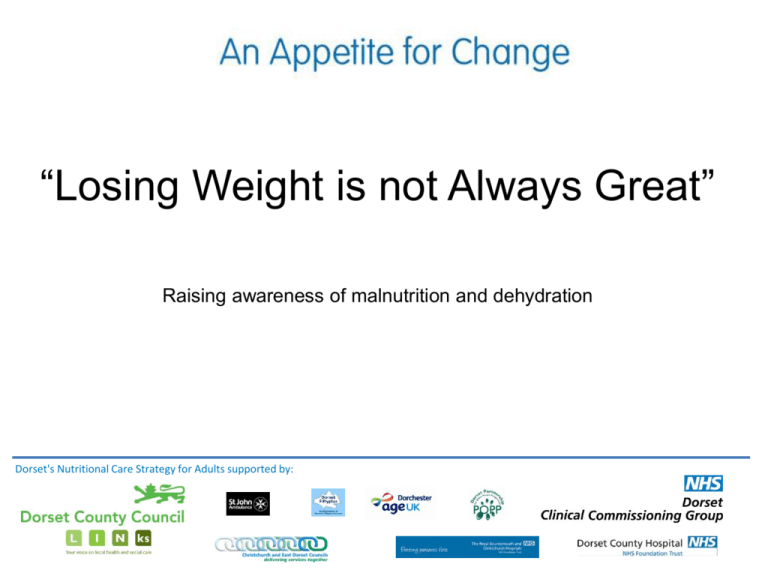
“Losing Weight is not Always Great” Raising awareness of malnutrition and dehydration Dorset's Nutritional Care Strategy for Adults supported by: Malnutrition does exist in the UK Unplanned weight loss? Looking a bit thin? Have you ever met anyone who has: • • • • • • • Lost half a stone recently without trying to? Experienced unintentional weight loss? Not eaten properly for a couple of weeks? Replaced their clothes with smaller ones? Made another hole in their belt or watch strap? Taken their wedding ring off because it was loose? Dentures that no longer fit properly? Dorset's Nutritional Care Strategy for Adults supported by: Facts about malnutrition • • • • • • • • • 93% of adults suffering from malnutrition live at home 3 million adults in the community are affected 22% of over 60’s skip meals More likely to affect older women than older men 37% of adults admitted to care homes suffer from malnutrition 47% of adults admitted to nursing homes suffer from malnutrition 1 in 3 adults admitted to hospital suffer from acute malnutrition Every 10 minutes an adult dies with malnourishment in hospital The risk increases with age and dementia Dorset's Nutritional Care Strategy for Adults supported by: Some of the reasons for malnourishment • • • • • • • • • • • • Caring for someone else Changes in taste and smell Losing someone close to you Feeling lonely or depressed Loss of appetite Some illnesses can cause weight loss Some medications affect appetite and absorption Difficulty chewing or swallowing Dentures that no longer fit properly Financial difficulties Being less mobile than you used too Struggling to cook or shop Dorset's Nutritional Care Strategy for Adults supported by: Why losing weight is not always great Unintentional weight loss can result in: • • • • • • • • 2.1 times more GP visits 3 times more likely to be admitted to hospital Increased likelihood of picking up infections Increased risk of chest infections Injuries taking longer to heal Increased likelihood of feeling more tired Depression Confusion and subsequent risk of falls & fractures Dorset's Nutritional Care Strategy for Adults supported by: Some ways to combat malnutrition… • • • • • • • • • Eat what you fancy Enjoy your food Eat breakfast Keep easy to prepare foods in the house Eat little and often Try to avoid “low fat” products Add extra calories to your meals Eat cream, cheese and full fat milk Eat in company when you can Dorset's Nutritional Care Strategy for Adults supported by: Facts about dehydration Water is a basic nutrient and critical to human life, drinking more water will bring many health benefits Did you know: • A third of people over 55 only drink one or two glasses of water per day • In the same age group one in ten drink just one glass per day! The need to drink more increases: • In hotter weather or in warm rooms • With increased physical activity • With diarrhoea or vomiting • During a period of fasting • If taking water tablets or laxatives Dorset's Nutritional Care Strategy for Adults supported by: Common Myth If you have a bladder problem, restricting your water intake will NOT work, it will probably make it worse! Dorset's Nutritional Care Strategy for Adults supported by: Drinking plenty of water can improve your health. It can: • • • • • • • • • Reduce confusion and subsequent risk of falls & fractures Reduce headaches Ease constipation Reduce risks of urinary tract infections Reduce bladder irritation caused by fizzy drinks, caffeine and alcohol Improve blood pressure Improve skin suppleness Protect your teeth and gums Help you sleep better Dorset's Nutritional Care Strategy for Adults supported by: Some of the ways to combat dehydration • • • • • • • Drink more than you do now! Drink even if you do not feel thirsty Aim for 6-8 glasses of fluid during the day (excluding alcohol) Water is best but other liquids count too Eat fluid rich foods (soup, fruit, vegetables, jelly) Have a full glass of water when taking your tablets Keep a jug of water in the fridge or next to you if your mobility is poor • Check your urine when you go to the loo (clear and odourless is best!) Where to get help, support and advice • GP’s will offer a check up and can refer onto a dietitian if required • Dorset’s Adult Access Team 01305 221000 • Local dietetic departments can offer advice Information sources Build Yourself Up (guide to help you put on weight) Available from: www.dorsetforyou.com/407934 or Catering Services 01305 225934 Eating Opportunities Directory (details about lunch clubs, meals on wheels and shopping services) Available from: www.dorsetforyou.com/eatingopportunities or Dorset POPP 01305 224841 Dorset's Nutritional Care Strategy for Adults supported by:

